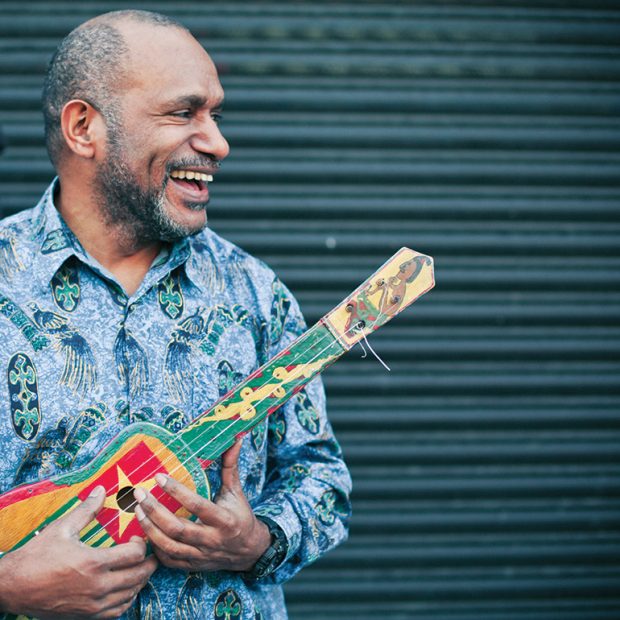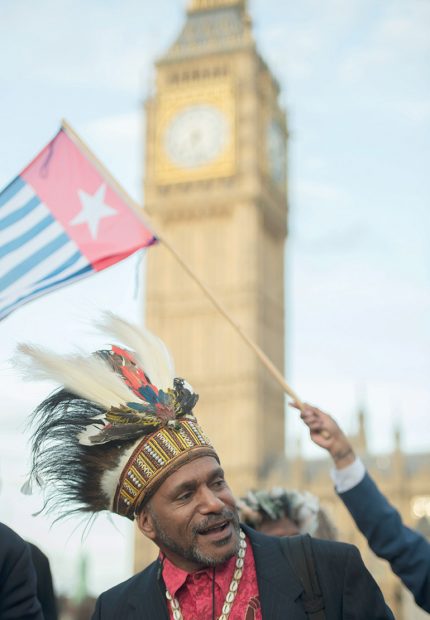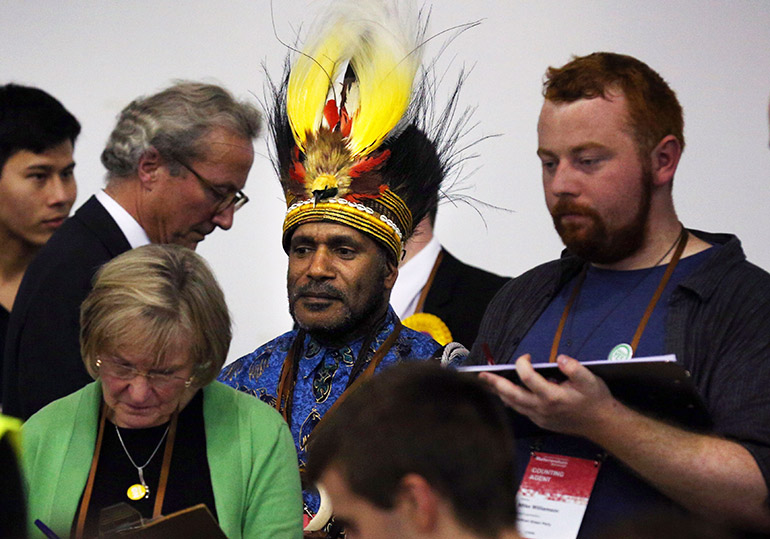Whether Benny Wenda is addressing the UN, lobbying heads of state or meeting with fellow activists, he invariably dons his tribe’s elaborate bird-feather headdress and a curved pig tusk that hangs from a string of cowrie shells around his neck. The exiled West Papuan independence leader proudly wears the traditional attire of his Lani tribe in distinctly nontraditional settings, far from his homeland, as a representation of his people.
“[It] is very important for our customs and it also symbolises peace because when we have some clashes between tribes [it is used], and also exchanged when you marry – that’s part of the dowry and it has very important value economically,” he explains of the pig-tusk necklace during a telephone interview with Southeast Asia Globe. “So, that’s my tie; I never put on the European tie.”

For Wenda, such symbolism embodies his people’s defiance of their Indonesian colonisers and their attempts to impose Indonesian cultural norms on West Papuans at the expense of traditional ways of life.
West Papua is, both geographically and culturally, distant from much of Indonesia. Jayapura, the outlying region’s largest city, is located more than 5,000km from Jakarta. Like its neighbour to the east, Papua New Guinea (PNG), indigenous inhabitants of West Papua are Melanesians whose physical characteristics and customs closely mirror those of Pacific islanders.
Although it is now changing, particularly for those living in cities, life for many West Papuans has long revolved around tribal obligations and the rhythmic cycles of nature. “When I grew up in my village, I thought there is nobody [else] out there, only my tribe or my clan,” Wenda recalls with a laugh. “But I tried to learn how to make the gardens, and how to make the bow and arrow, and how to hunt, and how to look after forests. I had to learn how to survive in the bush; that kind of [thing]. I didn’t know there were strange people out there. That was my childhood. But [when] the strange people came and we were surrounded and couldn’t do anything, our life was very difficult.”
Those “strange people” arrested and imprisoned Wenda in 2002 for allegedly inciting an attack on a police station in Jayapura. He says Indonesian authorities subjected him to torture and solitary confinement before he escaped from jail while on trial, trekking for three weeks through the tropical jungle until he reached the safety of PNG. A year later, Wenda was bound for the UK, where he was reunited with his wife and granted political asylum. He and his family have lived in exile ever since.
He now spends his days campaigning from his Oxford headquarters for the Free West Papua movement, regularly criss-crossing the globe to bring attention to his people’s underreported and long-ignored plight.
Wenda’s journey from the rugged mountains of remote West Papua to the cobbled streets of Oxford began in 1977, when Indonesian-flagged military jets swept over his village in central West Papua. Bombs rained down on the Baliem Valley in response to a rebellion by highlanders, sending tens of thousands scrambling from their homes in desperation.
Among the throngs of the displaced was Wenda, at the time a small boy, who ever since has been weighed down by the horrifying mental images of Indonesian troops raping his aunt and beating his mother before his eyes.

“Some of [those targeted] are still alive; many, many of them have died. Some of them, their gardens were destroyed and they died of hunger in the bush,” Wenda says of the attack. “A number of families were killed, and nobody came.” To be more precise, an estimated 4,100 people were wiped out in the aerial and ground raids that took place in 1977 and 1978.
Formerly a Dutch colony, West Papua – the name given to two provinces on one half of an island shared with PNG – had declared independence in late 1961. Just months later, the new nation easily defeated an Indonesian invasion but, driven by Cold War politics, the US pledged support to its archipelagic ally and in 1962 the UN agreed to transfer administration of the territory to Indonesia, on the condition that an independence referendum be held the following year.
It was not until 1969 that a farcical referendum was held, in which just 1,026 West Papuans – less than 0.2% of the population – were permitted to cast a ballot. The so-called “Act of Free Choice” also saw the handpicked voters subjected to violence, threats and intimidation. The result was a formality, and Indonesia officially incorporated the resource-rich region into its territory.
With the bitter taste of rescinded freedom lingering, West Papuans fought back – and continue to do so to this day. The 1977-78 assault was one of the worst episodes in Indonesia’s brutal repression of the restive islanders, which has morphed into a drawn-out subjugation that has claimed the lives of between 100,000 and 500,000 people (estimates vary wildly, in part due to a media reporting blackout imposed by Indonesia).
The years following the attack on his village were a formative period for Wenda, who would go on to become a leader of West Papua’s independence movement after studying sociology and politics at university in Jayapura. “That was really terrible history, and that’s what made me grow up to fight for peace,” he says. “For five years I was hiding in the bush. I went from one mountain to another mountain, just hiding. Many people were dying across the mountains, and I was one of the survivors.”
As well as ongoing violent repression – countered by pockets of armed resistance from guerrilla groups, generally in rural areas, and peaceful demonstrations typically attended by thousands of urban dwellers – West Papuans have seen large numbers of Indonesian settlers moving to their homeland from other islands. These immigrants now make up about half of the region’s population.
It is this multi-pronged campaign of killings, torture and cultural domination spanning more than five decades that has led Wenda and others to dub the conflict a “slow-motion genocide” – a charge the Indonesian government vehemently denies.
“[From the time when] Indonesia illegally occupied West Papua until today, the killing continues. One example that I would use is that in 1970 the population of PNG compared with West Papua was 50/50. Now [the] PNG population is 7.5 million, and West Papua’s is 3.5 million. Where is this number? Where have they gone? Some of them have been killed, some are refugees – 10,000 refugees live in Papua New Guinea – some of them are displaced, and some of them have died,” Wenda says.
“They [the Indonesians] treat my people differently and they destroy our culture, our identity, our language and way of life. That’s cultural genocide,” he adds. “That’s why it’s better to be free from Indonesia. Then we can peacefully live side by side. That’s what my aim is, to free my people.”
This slow-burning, but deadly, conflict has largely played out under the global radar and with barely an acknowledgement in Southeast Asia. Partly, says Wenda, this disregard can be attributed to a blanket ban on foreign media and international NGOs entering West Papua. Partly, he says, it’s politics.
“Nobody really knows in Asia, for example in Cambodia or Thailand or Singapore or Malaysia. Indonesia is pretending they’re good guys, but what they’re doing [in] their own backyard is very terrible. I think this is why Indonesia tries to play clever games, you know, [pretending] there is nothing happening in West Papua.”
West Papua has often been compared to Timor-Leste, which finally clawed back its independence from Indonesia in 2002. But despite Free West Papua campaigners’ strident efforts, they have been unable to gain significant political traction abroad. The international community, by and large, continues to recognise Indonesia’s sovereignty over the region. One key factor is economics: West Papua is incredibly resource-rich, boasting gas, timber, palm oil and the world’s largest gold and copper mine, Grasberg. Yet while the region is the greatest contributor to Indonesia’s GDP of all provinces, its two provinces remain the poorest. “[Indonesia] sees West Papua as nothing to do with the people; they only care about our resources,” says Wenda.
Western powers – such as the US, Australia and the UK, which helped Indonesia stake its claim on West Papua through diplomatic and military support – are accused of complicity, along with businesses owned by their citizens. Grasberg mine is owned by US-based Freeport, while Australian mining giant Rio Tinto has a minority stake in the company; UK petroleum corporation BP and a host of Dutch firms are also active in the region. From where Wenda is sitting, these powerful multinationals are operating illegally on his people’s lands. “But nobody knows [about it]; that’s why these international companies are working alongside the Indonesian government, ignoring the fight for justice and fight for freedom. They get away [with it] with impunity.”

Indonesian President Joko Widodo pledged when he was elected in 2014 to address human rights issues in West Papua and engage in constructive dialogue with local leaders. Yet this has not transpired, and Wenda believes the situation there is actually deteriorating. He points to the alleged killing of a high school student by security forces in the town of Nabire, in the west of the island, in June as an example, as well as increasing restrictions on freedom of assembly – mass arrests saw 2,000 people detained in early May in the lead-up to the anniversary of West Papua’s 1969 incorporation into Indonesia. A further 1,000 protestors were reportedly arrested during a demonstration in June.
Wenda is forced to watch on from afar as the crackdowns continue. While the Nobel Prize nominee’s international campaigning is starting to gain momentum – through social media, strong backing across the Pacific and pockets of support from the likes of UK opposition leader Jeremy Corbyn – he struggles at times with his distance from home.
“It’s really upsetting, because for us tribal people you cannot separate land and forest and mountain and river. Our heart is there; we are connected really closely. And to our family, because that is our life. [It was] very difficult when I came to the UK and [began] travelling around the world; very strange. And sometimes I really feel that I’m not really connected, I don’t belong to here. But for safety reasons I’m here; this government allows me to be here, and I want to use this freedom to campaign.”
Wenda and his wife, Maria, continue to embrace their culture. Their band, the Lani Singers, plays traditional West Papuan music and features Wenda on a ukulele painted with the Morning Star, the banned flag of the Free West Papua movement. The couple aim to celebrate and preserve West Papuan culture, of which music and singing is an integral part, and they have tried to pass on such traditions to their six children.
“When they grow up they will find out for themselves whether they want to continue to campaign or not, but I need to tell [them] honestly why we’re here. I always say: ‘We’re on a mission. We came here not looking for a better life or to live here… You have to adapt to life here but remember your people.’ We sing together, with our traditional [instruments], and I also taught them to speak their mother tongue, so they are able to remember. That’s my obligation.”
Wenda says he is not willing to accept anything less than full independence for West Papua and will keep fighting until he achieves this aim. He holds on to the belief that, in time, he will eventually succeed – allowing him to return to his home. “That’s what I want. I’m really confident that, one day, I will go back where I came from.”


